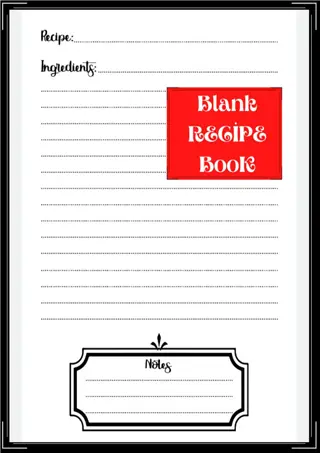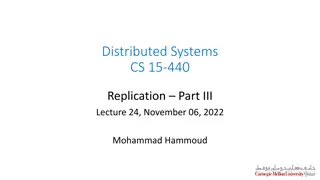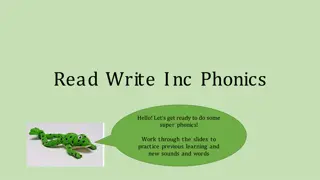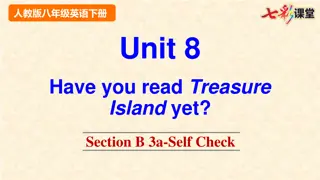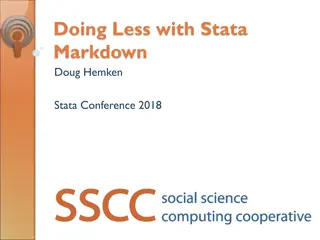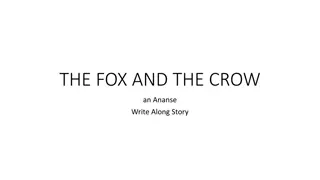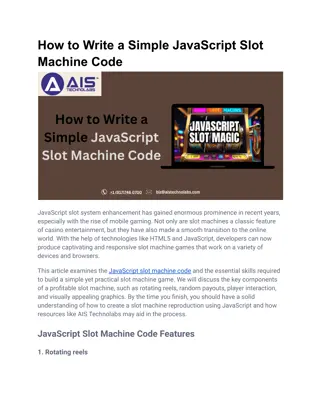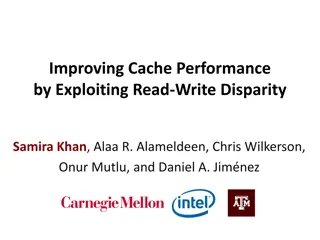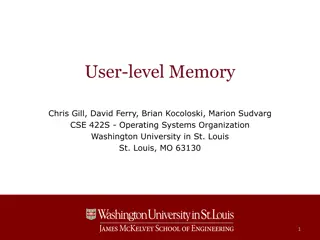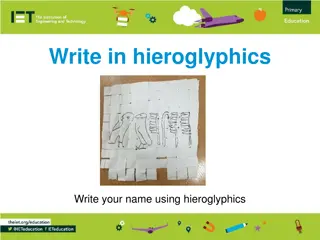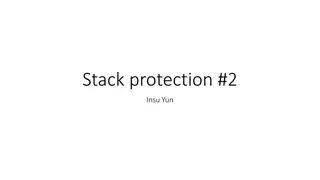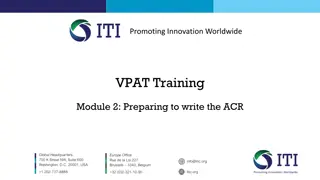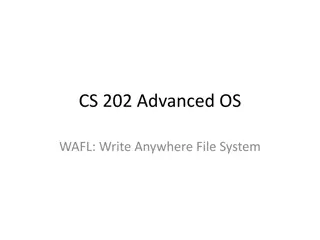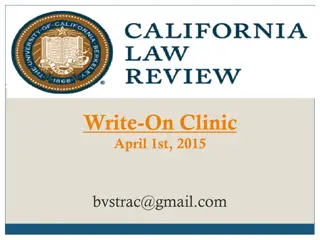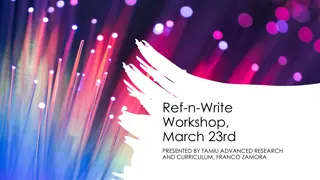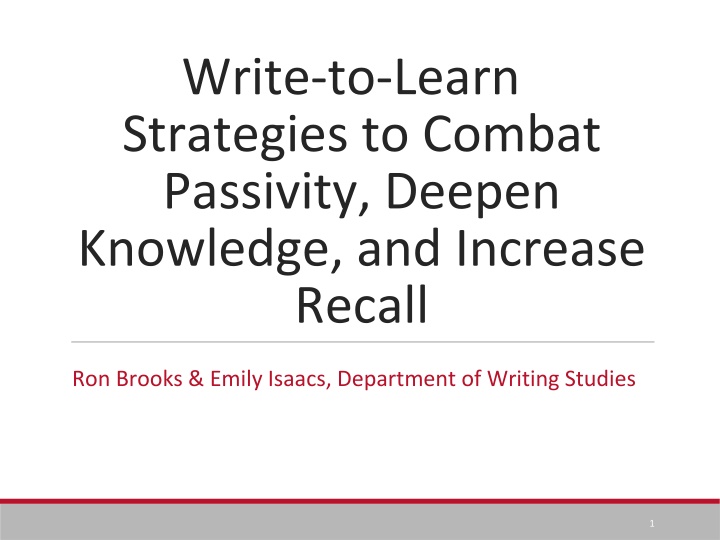
Effective Strategies for Writing to Enhance Learning Engagement
Discover powerful solutions to encourage writing in educational settings, combat passivity, deepen knowledge, and improve information recall. Learn how writing activities can boost cognitive processing and critical thinking skills while enhancing comprehension and problem-solving abilities.
Download Presentation

Please find below an Image/Link to download the presentation.
The content on the website is provided AS IS for your information and personal use only. It may not be sold, licensed, or shared on other websites without obtaining consent from the author. If you encounter any issues during the download, it is possible that the publisher has removed the file from their server.
You are allowed to download the files provided on this website for personal or commercial use, subject to the condition that they are used lawfully. All files are the property of their respective owners.
The content on the website is provided AS IS for your information and personal use only. It may not be sold, licensed, or shared on other websites without obtaining consent from the author.
E N D
Presentation Transcript
Write-to-Learn Strategies to Combat Passivity, Deepen Knowledge, and Increase Recall Ron Brooks & Emily Isaacs, Department of Writing Studies 1
Writing to Learn Means Learning to Think As teachers we can choose between (a) sentencing students to thoughtless mechanical operations, and (b) facilitating their ability to think. If students' readiness for more involved thought processes is bypassed in favor of jamming more facts and figures into their heads, they will stagnate at the lower levels of thinking. But if students are encouraged to try a variety of thought processes in classes, they can, regardless of their ages, develop considerable mental power. Writing is one of the most effective ways to develop thinking. (Forsman 162) 2
What writing does for learners: cognitive processing language provides us with a unique way of knowing and becomes a tool for discovering, for shaping meaning, and for reaching understanding (James Britton) A few research findings: 1st year Biology students: summary writing of class sessions increased comprehension and problem-solving on post-test (Horton et al) 1st year Bio: Journal writing on processes and problems as supplement to lab report increased scores on MC exam (McCrindle & Christensen) HS students, social studies: Restricted (Q&A, summary types) writing improves recall, analytic writing improves comprehension (Apple & Langer) Move from knowledge telling to knowledge transformation through increasing complexity of writing tasks (Bereiter and Scardamalia) 3
Yet little writing in class. why? Don t have time to read & evaluate more writing Don t have time -- all time alloted for. Students don t like writing in class Students won t write in class -- will surf, text, daydream Like the idea, but really not sure what to do I m not a writing teacher and so don t feel equipped to teach writing. 4
Solutions Don t mark-up & grade: Assigning writing assigned grading Instead, light evaluation: explain the light evaluation approach to students: that it improves learning, that you re not reading, marking, and grading traditionally give credit for number of words, frequency of writing grade simply: complete/incomplete Assign peer feedback: students write, students read, students comment be directive in peer feedback. For example, Read peers feedback and 1) Summarize in two sentence; 2) Offer a countering perspective, and 3) Offer a suggestion Vary the writing to learn activities, modalities, formats, etc. e.g., On index cards by hand vs on a live google doc; e.g., Instructo to write freely or write to a specific question, etc. 5
Writing-to-Learn Scale: Writer-Center to Reader-Centered 1. Pure freewriting: focuses the mind for engagement 2. Focused freewriting: focuses the mind on a topic or idea. 3. Responding to a open-ended prompt: furthers thinking on a topic or idea 4. Responding to a specific prompt: promotes understanding of a topic or idea. 5. Writing a summary: prompts re-reading and aids recall 6. Writing a draft essay [essay = to try. ]: promotes true comprehension as writers try out their ideas in relation to others ideas. 7. Writing a report, or public essay: informs or educates others. 6
Whats on Your Mind in any course that includes writing assignments As a practice, students write for 5 minutes at the start of every class. At the end of the five minutes, instructor asks students what they wrote about and if anyone wants to share. Instructor then uses the material shared to talk about aspects of essay writing, e.g.: making claims developing ideas paragraphing writing concisely etc. 7
Writing in the Sciences (Gen Ed Writing for Science Majors) Discussion 1: As a way of introducing yourself, tell us who you are and what your major in CSAM is, and tell us a story about how you first knew you would be interested in this major. (150 Words) Discussion 2: Last class we wrote about an experience we had with science. This week I want you to think and write about writing. Based on your your past experiences with writing, answer the following questions: What do you see as your strengths as a writer? What about your writing do you think needs more development? What are your writing-related goals for this semester? What are the ways that you think you can best meet those goals? (300 words) 8
Upper Level Content Course Beginning Activities Focused Summaries: write out a paragraph for assigned reading, with specific directions; i.e., what is the argument & what are 3 supporting examples. Annotations: write out key ideas of assigned reading and briefly evaluate strengths & weaknesses of article s argument or research. Concluding Activities Teach others: at conclusion of unit, write out to an imaginary absent classmate the major themes, discoveries, and questions of the unit. What did I learn? A focused quick detailing to self what one has learned, with expectation of identifying a specific number of independent points. Identifying the conflicts: Review the major issues or authors discussed during this class/unit, and identify conflicting opinions, stating the opinion of side. 9
Strategies for Assessment No to little assessment: rely on teacher authority and internal value. Part of class participation grade Complete/no complete (double as attendance) Plus/check/minus mark Complete writing activity within Canvas and assess each activity word count evaluative grading don t comment CAVEAT: don t do anything that makes you hesitate to assign writing 10
Creating Assignments Right now: Craft a Write-to-Learn question or activity that you could ask students to complete in class. 11
Q&A Office for Faculty Advancement website www.montclair.edu/faculty-advancement 12

